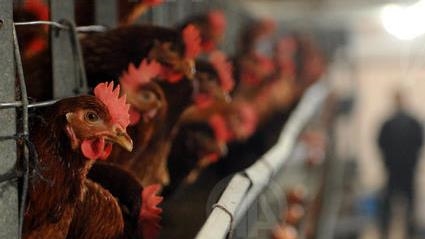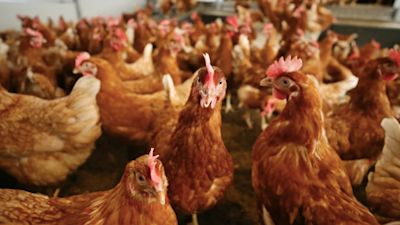Poultry farms in southwest France gripped by bird flu
H5N1 virus has been identified at 7 farms in Landes and Pyrenees-Atlantiques

Shweta Desai |28.12.2021
PARIS
A new outbreak of highly contagious avian influenza has been detected at poultry farms in southwestern France, local media reported Monday.
The H5N1 virus has been identified on seven poultry farms -- five in Mant and one in Castelner in the Landes department and one in the Malaussanne commune in the Pyrenees-Atlantiques department of the Nouvelle-Aquitaine region, a report by public radio outlet France Blue said.
The infection has progressed since the first case was confirmed at a farm in Hastingues, Landes on Dec. 19.
To prevent the virus from spreading to other farms, authorities are carrying out the preventive slaughter of poultry from the infected farms, and 37 municipalities in Pyrenees-Atlantiques and 34 in the Landes department linked to the outbreak have been declared restricted areas. The transport of live birds and poultry products including meat and eggs as well as manure and slurry indoors is prohibited in these areas.
Other poultry farms have been directed to follow biosecurity rules and exercise daily surveillance in case of abnormal mortality of the birds.
The virus is generally found among wild birds and is transmitted to domestic poultry in many European countries, a statement from the prefecture of Pyrenees-Atlantiques said. The consumption of meat, fatty liver and eggs does not present any risk to humans, it added.
Around the same time last year, poultry farms in the southwest of the country were infected with the H5N8 virus, leading to the culling of over 1 million birds. The region has a high number of duck farms and is famed for the production of foie gras, the national gastronomic delicacy of the fattened liver of ducks or geese.
Tuesday 21 December 2021, 1:28pm

Around 28,000 birds have been culled in a suspected avian flu outbreak in Co. Londonderry (stock photo)Credit: PA Archive
A bird flu outbreak has triggered a mass bird cull in Northern Ireland.
Around 28,000 birds have been culled in the latest suspected avian flu outbreak in Co. Londonderry.
It follows two previous outbreaks in a commercial poultry flock near Markethill, Co Armagh, and a commercial duck flock in Coagh, Co Tyrone, which were confirmed as positive for HPAI HN51 following results from the National Reference Laboratory.
Agriculture Minister Edwin Poots has briefed a range of key stakeholders from both the Northern Ireland and Great Briatain poultry sectors following the detection of the suspect case in Ballinderry.
A bird flu outbreak has triggered a mass bird cull in Northern Ireland.
Around 28,000 birds have been culled in the latest suspected avian flu outbreak in Co. Londonderry.
It follows two previous outbreaks in a commercial poultry flock near Markethill, Co Armagh, and a commercial duck flock in Coagh, Co Tyrone, which were confirmed as positive for HPAI HN51 following results from the National Reference Laboratory.
Agriculture Minister Edwin Poots has briefed a range of key stakeholders from both the Northern Ireland and Great Briatain poultry sectors following the detection of the suspect case in Ballinderry.
This takes Northern Ireland’s number of confirmed outbreaks so far to four, with one more suspected and awaiting confirmation.
Mr Poots said the outbreak was the "worst ever" across the UK, and called for vigilance among flock owners.
This is a particularly persistent strain and it will use any lapse in biosecurity to gain access to a flock.Agriculture Minister Edwin Poots MLA
“It’s extremely disappointing that this is now the worst outbreak ever across the UK and yet another stark reminder of the importance of excellent biosecurity measures which ultimately, are the only protection we have in preventing Avian Influenza getting into our housed flocks.
"This is a particularly persistent strain and it will use any lapse in biosecurity to gain access to a flock. Everyone must not only use our biosecurity checklist to see if they’ve ticked all the boxes, but get into a routine of checking it every morning.
"Make sure there are no forgotten or damaged access points and review your procedures every day to reduce the risk.
“I would like to thank the poultry sector for working so hard to protect our valuable industry and for how willing they are to make significant sacrifices to minimise the spread of this outbreak.”
Bird flu outbreak is the biggest ever and poultry keepers must do more to keep it out says the government's chief vet
By Lauren Abbott
labbott@thekmgroup.co.uk
21 December 2021
Bird keepers are being told to take all the action they can to keep flocks safe as the UK grapples with its largest ever avian flu outbreak.
The UK’s Chief Veterinary Officer Christine Middlemiss says those keeping poultry or birds must make sure they are following all the biosecurity rules in place to try and slow the spread of the disease this winter.

There have been 60 confirmed instances since November
The country is facing its largest ever outbreak with 60 cases now confirmed across the UK since the start of November.
To help try and control the spread of disease the government introduced new housing measures last month which means anyone keeping chickens, ducks, geese or any other birds must now keep them indoors by law. This is to ensure wild birds migrating to the UK for the winter months, which often carry bird flu, do not mix with captive chickens, ducks, geese or other birds and spread the infection.
There are also requirements for keepers to disinfect clothing and footwear, which can also transport the virus into enclosures.
The country is facing its largest ever outbreak with 60 cases now confirmed across the UK since the start of November.
To help try and control the spread of disease the government introduced new housing measures last month which means anyone keeping chickens, ducks, geese or any other birds must now keep them indoors by law. This is to ensure wild birds migrating to the UK for the winter months, which often carry bird flu, do not mix with captive chickens, ducks, geese or other birds and spread the infection.
There are also requirements for keepers to disinfect clothing and footwear, which can also transport the virus into enclosures.

Defra says avian flu occurs naturally in wild birds
The UK's Chief Veterinary Officer believes that while the main source of infection comes from migratory wild birds, those failing to implement these measures risk infecting their own flocks, she says, by walking the virus into holdings.
Christine Middlemiss said: "We have taken swift action to limit the spread of the disease including introducing housing measures. However we are seeing a growing number of bird flu cases both on commercial farms and in backyard birds right across the country.
"Many poultry keepers have excellent biosecurity standards but the number of cases we are seeing suggests that not enough is being done to keep bird flu out. Whether you keep just a few birds or thousands you must take action now to protect your birds from this highly infectious disease.
"Implementing scrupulous biosecurity has never been more critical. You must regularly clean and disinfect your footwear and clothes before entering enclosures, stop your birds mixing with any wild birds and only allow visitors that are strictly necessary. It is your actions that will help keep your birds safe."
The UK's Chief Veterinary Officer believes that while the main source of infection comes from migratory wild birds, those failing to implement these measures risk infecting their own flocks, she says, by walking the virus into holdings.
Christine Middlemiss said: "We have taken swift action to limit the spread of the disease including introducing housing measures. However we are seeing a growing number of bird flu cases both on commercial farms and in backyard birds right across the country.
"Many poultry keepers have excellent biosecurity standards but the number of cases we are seeing suggests that not enough is being done to keep bird flu out. Whether you keep just a few birds or thousands you must take action now to protect your birds from this highly infectious disease.
"Implementing scrupulous biosecurity has never been more critical. You must regularly clean and disinfect your footwear and clothes before entering enclosures, stop your birds mixing with any wild birds and only allow visitors that are strictly necessary. It is your actions that will help keep your birds safe."

People who keep chickens must follow strict rules by law to help prevent the spread of the disease. Picture: iStock.
Avian influenza is in no way connected to the COVID-19 pandemic, which is caused by the SARS-CoV-2 virus and is not carried in poultry or captive birds.
Public health advice remains that the risk to human health from avian flu is low and poultry remains safe to eat - however people are being told to not touch or pick up any dead or sick birds that they find while out walking and instead report them to the dedicated helpline.
Avian influenza is in no way connected to the COVID-19 pandemic, which is caused by the SARS-CoV-2 virus and is not carried in poultry or captive birds.
Public health advice remains that the risk to human health from avian flu is low and poultry remains safe to eat - however people are being told to not touch or pick up any dead or sick birds that they find while out walking and instead report them to the dedicated helpline.
No comments:
Post a Comment